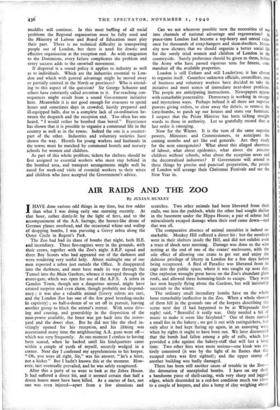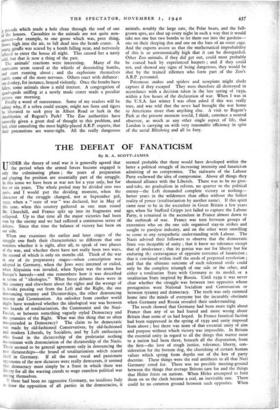AIR RAIDS AND THE ZOO
By JULIAN HUXLEY
IHAVE done various odd things in my time, but few odder than what I was doing early one morning recently. At that hour, rather dimly-lit by the light of fires, and to the accompaniment of the A.A. barrage, the hornet-like drone of German planes overhead, and the occasional whine and wallop of dropping bombs, I was pursuing a Grevy zebra along the Outer Circle in Regent's Park.
The Zoo had had its share of bombs that night, both H.E. and incendiary. Three fire-engines were in the grounds, with their crews, together with the Zoo's night A.R.P. squad and three Boy Scouts who had appeared out of the darkness and were rendering very useful help. About midnight one of our men reported a zebra just outside the Office. It disappeared into the darkness, and must have made its way through the Tunnel into the Main Gardens, whence it emerged through the stores-gate, which was open for use of the A.F.S. A zebra in Camden Town, though not a dangerous animal, might have created surprise and even alarm, though probably not despond- ency ; it was also a valuable animal (Grevy zebras are rare, and the London Zoo has one of the few good breeding-stocks in captivity) ; so half-a-dozen of us set off in pursuit, leaving another group to block the animal's retreat. With some driv- ing and coaxing, and generalship in the disposition of the man-power available, the beast was got back into the stores- yard and the doors shut. But he did not like the shed in- vitingly opened for his reception, and his jibbing was accentuated every time the neighbouring A.A. guns went off— which was very frequently. At one moment I confess to having been scared, when he backed until his hindquarters came within a couple of yards of myself, securely wedged in a corner. Next day I confessed my apprehensions to his keeper. " Oh, you were all right, Sir," was his answer, " he's a biter, not a kicker." But I hadn't known this at the moment. How- ever, tact eventually prevailed, and he was safely recaptured.
After this a party of us went to look at the Zebra House. It had suffered a direct hit, and it seemed certain that half a dozen beasts must have been killed. As a matter of fact, not one was even injured—apart from a few abrasions and scratches. Two other animals had been liberated from their stalls, one into the paddock, while the other had sought shelter in the basement under the Hippo House; a pair of zebras had miraculously escaped damage when their roof came down—and that was all.
The comparative absence of animal casualties is indeed re- markable. Monkey Hill suffered a direct hit: but the monkeys were in their shelters inside the Hill, and did not exhibit even a trace of shock next morning. Damage was done to the wire netting at the end of one of the cranes' enclosures, with the sole effect of allowing one crane to get out and enjoy the dubious privilege of liberty in London for a few days before being recaptured. A Bird of Paradise was liberated from its cage into the public space, where it was caught up next day. One explosion wrought great havoc on the Zoo's abundant glass roofs, and allowed three humming-birds to escape. They were last seen happily flying about the Gardens, but will inevitably succumb to the winter.
The ordinary small incendiary bombs have on the whole been remarkably ineffective in the Zoo. When a whole shower of them fell in the grounds one of the keepers describing the scene next day (I had happened to be at Whipsnade that night) said, " Beautiful it really was. Only needed a bit of music to make it seem like fairyland." One of them started a small fire in the bakery ; we got it out with extinguishers, but only after it had kept flaring up again, in an annoying way, when by rights it ought to have been out. We later discovered that the bomb had fallen among a pile of rolls, which has provided a joke against the bakery-staff that will last a long time. Two other fires were more serious—one kiosk was en- tirely consumed (it was by the light of its flames that the escaped zebra was first sighted); and the upper storey of another building was badly damaged.
There has been still another cause of trouble in the Zoo— the detonation of unexploded bombs. I have on my desk a handsome piece of shell-casing, with very sharp and jagged edges, which descended in a red-hot condition much too close to a couple of keepers, and also a lump of day weighing about pounds which made a hole clean through the roof of one of the houses. Casualties to the animals are not quite non- existent—for example, to one goose which was, poor thing, blown high into the air, to fall dead into the bcmb crater. A young giraffe was scared by a bomb falling near, and nervously refused to enter the house all night. This caused her a nasty cold, but that is now a thing of the past.
The animals' reactions were interesting. Many of the ruminants seem scared at the whistle of descending bombs, and start running about ; and the explosions themselves startle some of the more nervous. Others react with defiance: one donkey, for instance, brayed violently. Once the bombs have fallen, some animals show a mild interest. A congregation of quadrupeds sniffing at a newly made crater made a peculiar picture one morning. Finally a word of reassurance. Some of my readers will be asking why, if a zebra could escape, might not lions and tigers be liberated to seek prey in Albert Road or lurk in the shrubberies of Regent's Park? The Zoo authorities have naturally given a great deal of thought to this problem, and feel, after consulting the most highly-placed A.R.P. experts, that their precautions are water-tight. All the really dangerous animals, notably the large cats, the Polar bears, and the full- grown apes, are shut up every night in such a way that it would take not one but two bombs to let them out into the gardens— one on their sleeping den and one on the bars of an outer cage. And the experts assure us that the mathematical improbability of this is so astronomically high that it can be disregarded. Other Zoo animals, if they did get out, could most probably be coaxed back by experienced keepers ; and if they could not, and showed any signs of being dangerous, they would be shot by the trained riflemen who form part of the Zoo's A.R.P. personnel.
Poisonous snakes and spiders and scorpions might elude capture if they escaped They were therefore all destroyed in accordance with a decision taken in the late spring of 1939, within a few hours of the declaration of war. When I was in the U.S.A. last winter I was often asked if this was really true, and was told that the news had brought the war home to Americans more than anything else. A visit to Regent's Park at the present moment would, I think, convince a neutral observer, as much as any other single aspect of life, that London is carrying on with very reasonable efficiency in spite of the aerial Blitzkrieg and all its fury.







































 Previous page
Previous page